The University of Culture, together with the consortium of the international project dComFra of the EU Erasmus + program, has been actively participating in All Digital Week (The European Digital Competence Week) since 2019.
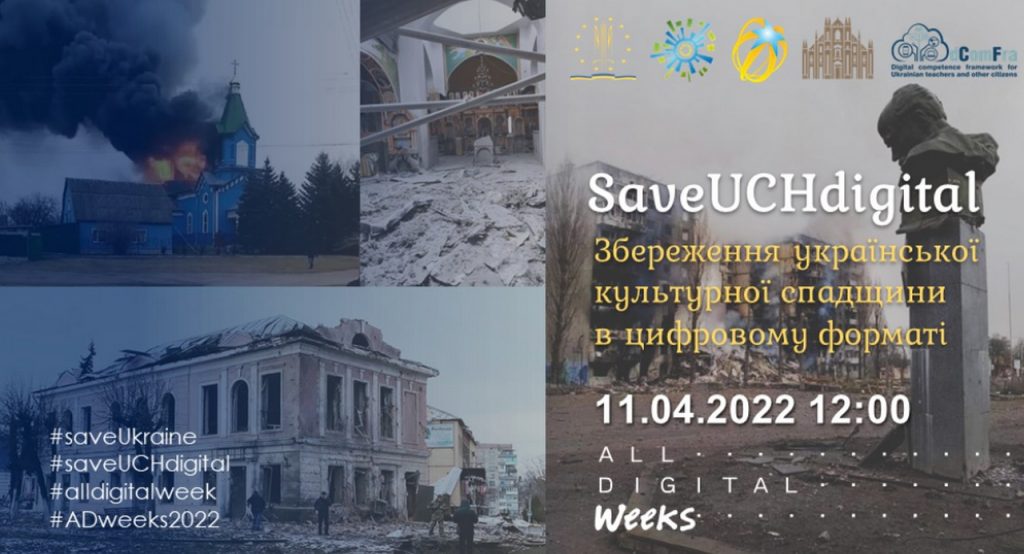
All Digital Week is an annual information campaign dedicated to the development of digital skills of citizens, organized by the leading European association All Digital, whose member organizations work with 25,000 centers of digital competence. This year the war came to Ukraine. The war, in addition to human casualties and the destruction of the infrastructure of Ukraine’s cities and villages, is a threat to Ukraine’s cultural heritage.
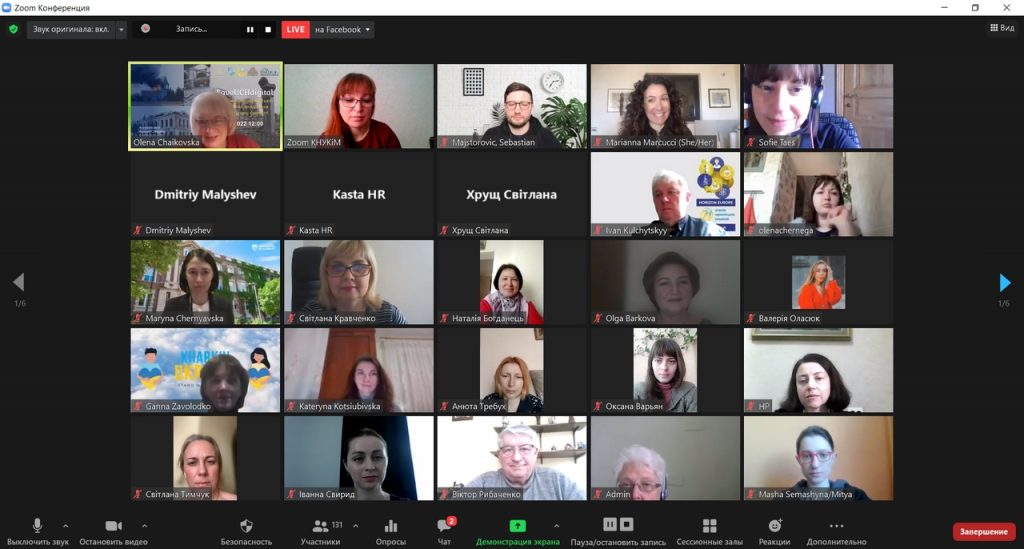
At this difficult time, the University of Culture as part of the initiative group (NGO GraDeSvit, Informal Professional Partnership “Digital Heritage”, NGO Institute of Museum and Monument Studies, NGO Agency of European Innovations) with the support of the international community launched a project to preserve cultural heritage in digital format “Saving Ukrainian Cultural Heritage in Digital (SaveUCHdigital)”.
The event was organized for a dual purpose. First, to present to the professional community, students, and teachers of Ukraine European projects for the preservation of digital cultural heritage, which have useful technological and organizational approaches to archiving online resources, as well as digital archives and funds of memory institutions, copies of which should be stored in secure remote storages. The second goal was to show our European partners the experience gained by Ukrainian specialists in the field of digital technologies in the cultural heritage sector, to determine possible further areas of information technology cooperation.
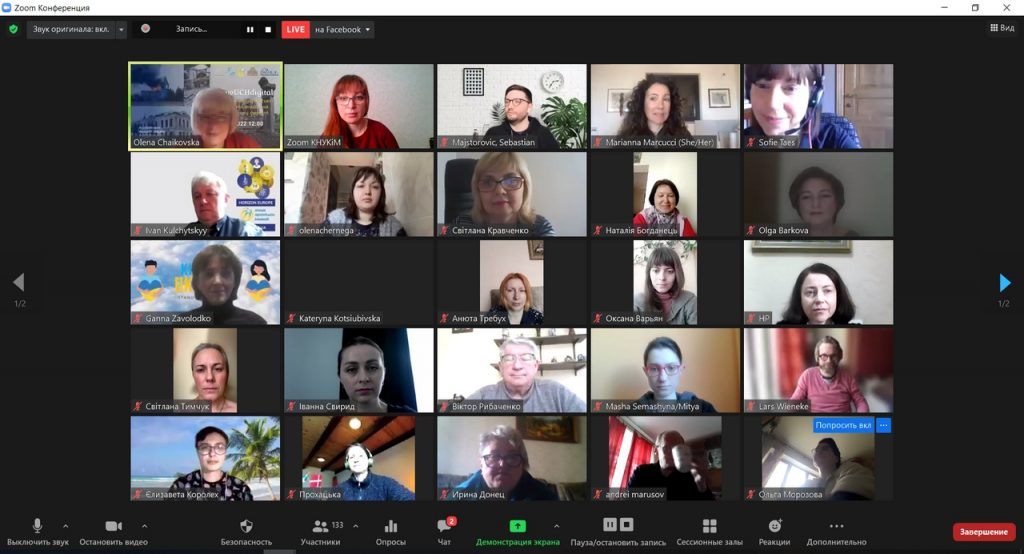
Speakers from Austria, Belgium, Italy, Canada, Luxembourg, the Netherlands, and Poland presented projects and gave presentations online. Ukraine was represented by specialists from Kyiv, Odesa, and Kharkiv. Up to 300 listeners joined the event, and about 70 specialists, students, and teachers from different regions of Ukraine expressed their desire to take part in further events. There were 13 speeches and discussions on issues related to Ukrainian cultural heritage.
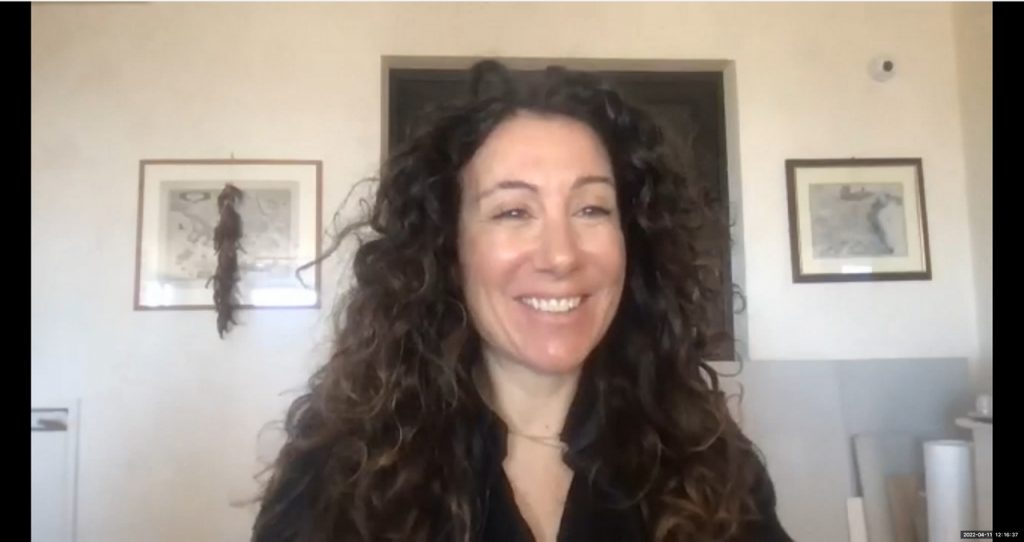
The event was opened by the Dean of the Faculty of Distance Learning of the Kyiv University of Culture Olena Chaikovska. She thanked her international colleagues for their support of Ukraine in word and deed. “Thank you to All Digital Board, Europeana Foundation, Europeana Network Association, Europeana Aggregators Forum for your Statements of Solidarity with Ukraine! I thank the entire international community for the support of millions of Ukrainians, both those who were forced to leave their homes and those who stayed. We are all trying to preserve our country and our culture. Preserve what is so important to our knowledge and understanding of who we are, where we came from, and whom we can become. We do it together. Thank you to all who are with Ukraine in their hearts! ”
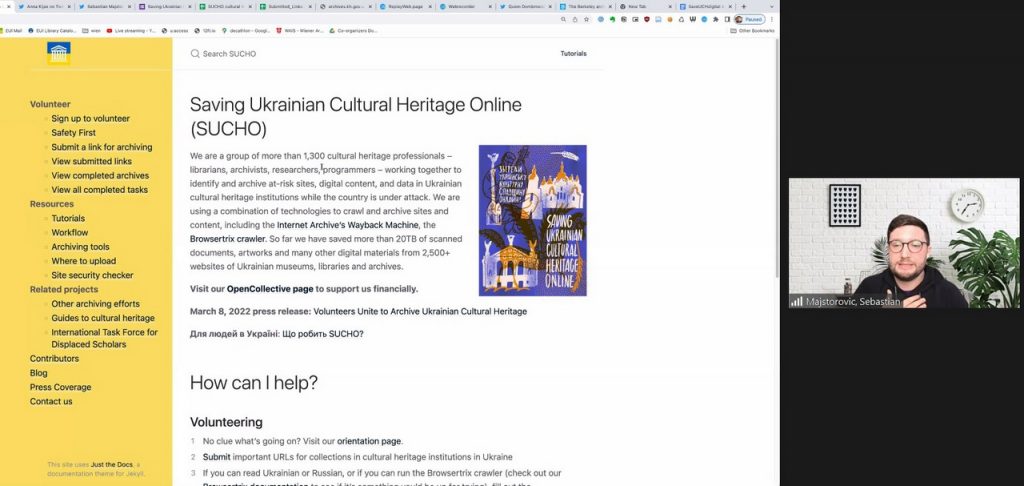
Marianna Marcucci, Member of the Board of All Digital, digital media curator, Vice President of Invasioni Digitali (Italy) made a speech. She congratulated all those present and thanked the organizers for their strength and courage to organize events in support of European Digital Competence Week. On behalf of the All Digital Board, Marianna expressed solidarity with the people of Ukraine and condemned the Russian invasion as an unjustified act of aggression against socially important values recognized by all democracies. “Every year, the All Digital Week campaign is held in coworking spaces, community centers, schools, universities, libraries, and other educational locations. From 2010 to 2021, more than 1,300,000 participants joined the European Digital Competence Week. It is extremely important to improve the digital skills of citizens, as 42% of the EU population do not have basic digital skills, and 72% believe that they will be replaced by jobs in the workplace. We support the Digital Education Action Plan (2021-2027) – a renewed policy initiative of the European Union to develop a sustainable and effective adaptation of education and training systems of EU member states to the digital age,” said Ms. Marianna and called on Ukrainian organizations to cooperate in projects of digital transformation of society.
Oleksandr Starodubtsev, a researcher at the National Institute for Nuclear Physics, a representative of the 4CH project (Florence, Italy), focused on the importance of preserving Ukrainian history, culture, and self-identity, especially in these dramatic times for Ukraine. The speaker acquainted the audience with the project Competence Center for the Conservation of Cultural Heritage (4CH), which receives financial support for its project activities from the European Union (https://www.4ch-project.eu/). The 4CH project team is a team of cultural heritage conservation experts from different countries of the European Union (Italy, Belgium, Lithuania, Poland, etc.) as well as the United Kingdom. The project aims to create a European Information Center for the Preservation of Cultural Heritage. From the first days of the Russian aggression, colleagues from the 4CH project offered methodological, organizational, and technical assistance in preserving Ukraine’s cultural heritage.
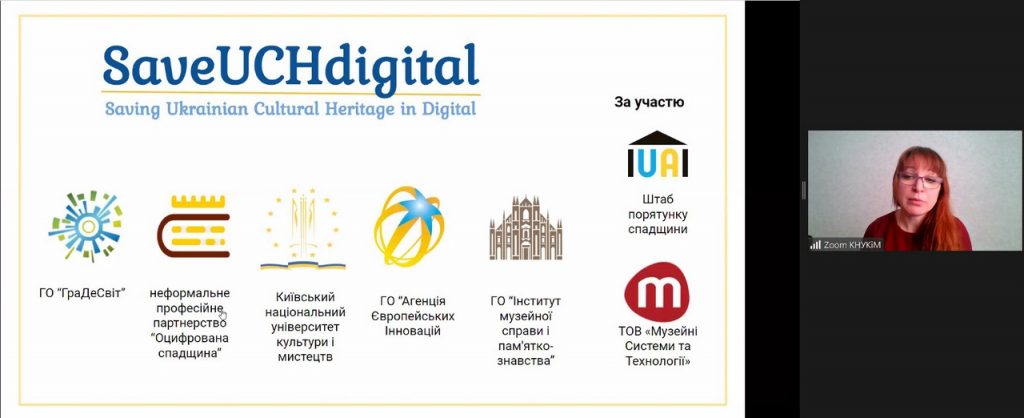
Sebastian Majstorovic, IT consultant at the Austrian Center for Digital Humanities and Cultural Heritage, one of the founders of the SUCHO initiative (Vienna, Austria) expressed his solidarity with Ukrainians currently suffering from the Russian invasion. He noted that he understands the suffering of people from Ukraine, as his father is from Bosnia, where there was also a military conflict in the 1990s. “The National Library was destroyed and due to the fire almost all the library funds were lost. This irreversible loss of cultural heritage in my father’s homeland had a profound effect on me as a historian and was in the depths of my consciousness when I saw photographs from Ukraine. That’s why my colleagues, Quinn Dombrowski from Stanford University and Anna Kijas from Tufts University, and I launched the Saving Ukrainian Cultural Heritage Online (SUCHO) initiative. We try to back up materials that have already been digitized in Ukraine and that have been available online on the websites of libraries, archives, museums, and all digital collections that have been digitized in recent years. More than 1,300 volunteer professionals in the field of cultural heritage – librarians, archivists, researchers, and programmers – joined our initiative. They work around the clock to save as many sites as possible. We have already saved more than 25 terabytes of Ukrainian heritage websites. We currently store data from the sites of libraries, museums, and archives of Ukraine, but are ready to expand our collection to any digitized cultural materials: historical documents, manuscripts, literature, music, theater, etc. We use WebRecorder – one of the best tools for web archiving.
A dramatic moment for me was the night of March 2, when I tried to save the site of the State Archives of Kharkiv Oblast and was able to get a file of 100 gigabytes. And in a few hours, the site went offline and is still offline to this day. We have a copy of it. Therefore, from our site, there is access to the entire site of the State Archives of Kharkiv Oblast. We are trying to save everything we can because servers are also physical objects, and now in Ukraine, they are in danger for various reasons. They can be physically damaged or subjected to cyber-attacks. Our initiative has a long way to go in terms of data storage and support for Ukrainian cultural heritage institutions, and our goal is to return the files to where they should be: to Ukrainian librarians, archivists, and curators!”
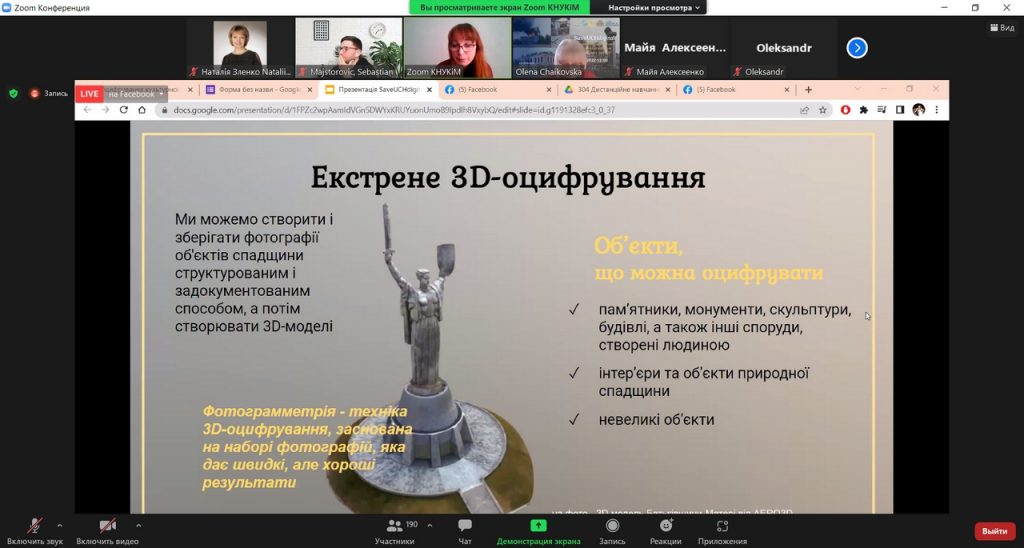
Maryna Tolmach, Lecturer at the Department of Computer Science, Kyiv University of Culture (Kyiv, Ukraine), and Olga Barkova, NGO GraDeSvit, Informal Professional Partnership “Digital Heritage” (Kyiv, Ukraine) gave a presentation on European projects offering their help (Saving Ukrainian Cultural Heritage Online (SUCHO) https://www.sucho.org, Competence Center for the Conservation of Cultural Heritage (4CH) https://www.4ch-project.eu) and other useful initiatives that provide opportunities for digital preservation of digitized cultural heritage and preservation of images of emergency photo-fixation of cultural heritage objects on servers in safe places of Europe.
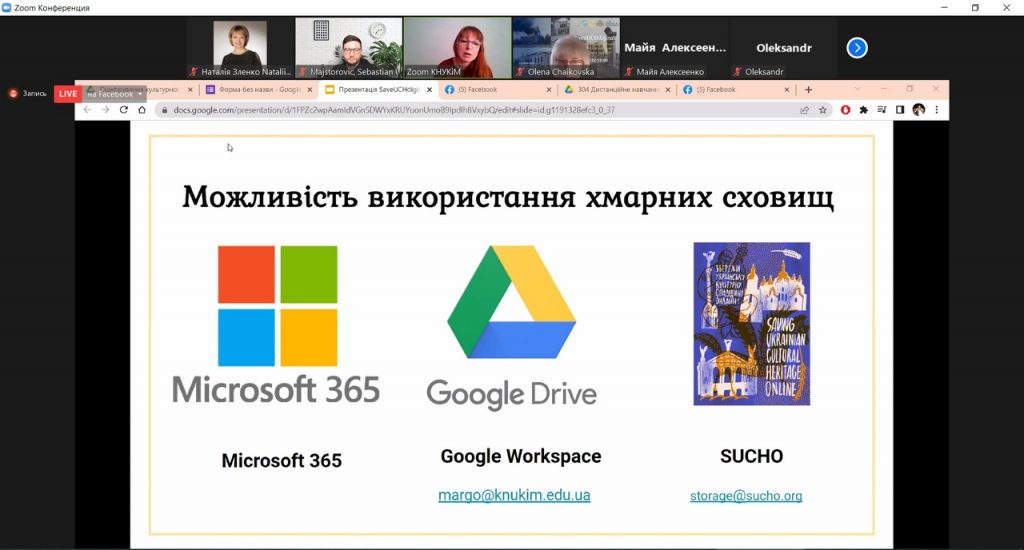
The authors talked about the algorithms and means of interaction with these two projects and introduced the method of emergency digitization with the subsequent use of images to create 3D models of cultural heritage sites.
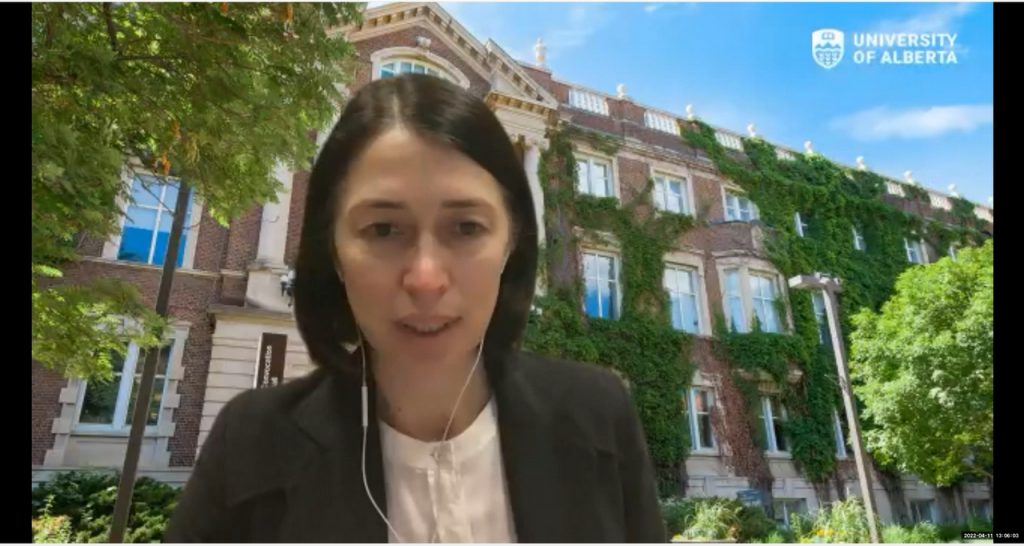
The experts also presented the Instruction on emergency digitization, provided by the specialists of the 4CH project, which was translated, adapted, and supplemented for easy use by Ukrainian specialists and fans of cultural heritage.
During the elaboration of the mechanism of interaction with projects, the legal basis and means of ensuring the legitimacy of the proposed remote storage of digital archives of cultural heritage were also determined. In addition, information is provided on the Blue Shield International Heritage Label. Information materials on the use of this sign were translated by Kateryna Yanushevska, a fourth-year student of the Department of Computer Science. At the end of the presentation, the directions for possible further cooperation with European projects and organizations were presented. Thanks to the initiatives of our European colleagues, we have gained opportunities that should be used to accelerate digital transformation and international cooperation in the cultural heritage sector.
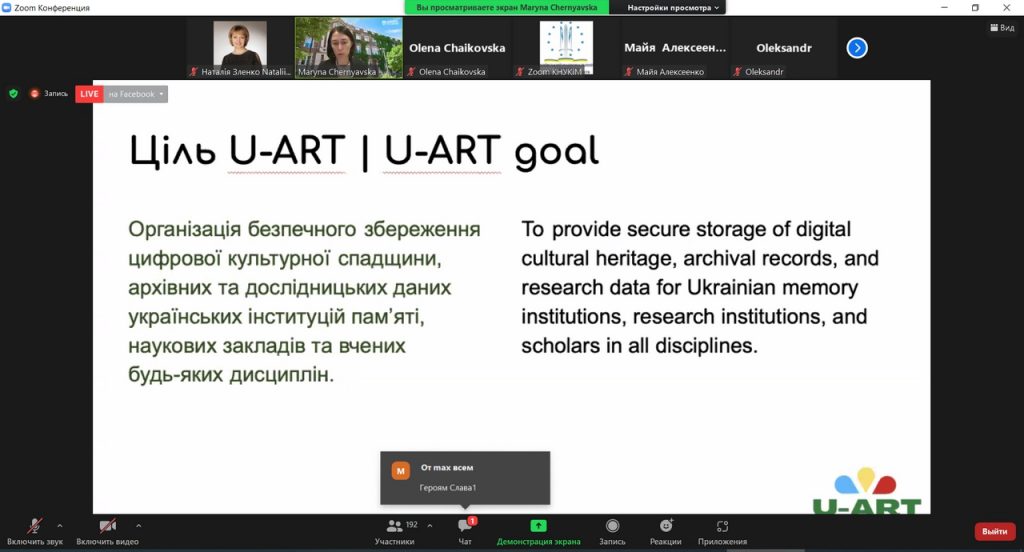
Maryna Chernyavska, archivist (University of Alberta, Edmonton, AB, Canada) presented the Ukraine Archives Rescue Team (U-ART) initiative of the University of Alberta, which is one of the most important centers of Ukrainian studies in North America. “The task of the initiative is to urgently organize the safe preservation of digital archival, and research data of Ukrainian scientists and research institutions. The initiative includes several research institutions at the University of Alberta, including the Canadian Institute of Ukrainian Studies and the Kule Folklore Center. The U-ART initiative is aimed at archivists, librarians, scientists in Ukraine, and their research institutions, whose digital data are under threat of destruction due to hostilities and Russian occupation. In collaboration with Canadian government agencies and university partners, we have prepared a secure repository for storing your scientific / research data (archival collections and databases, field research, oral histories, etc.). We also liaise with SUCHO, the Ukrainian Institute at Harvard, and other related initiatives.
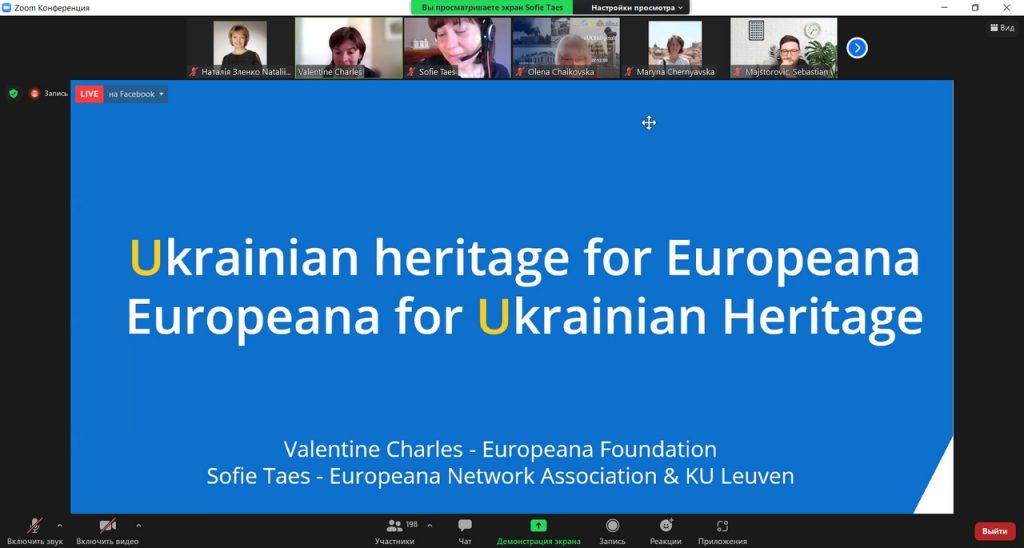
We offer secure data storage and various options for downloading them (depending on the specific situation of the person / organization in Ukraine and circumstances such as data size, stability of Internet connection, etc.). We have the technical ability to store large electronic archives and large files, such as video interviews. We have also launched a new initiative, namely to help our partners purchase digital equipment. We will be sincerely glad to cooperate with you. We are open to everyone! Thank you to the organizers and everyone present for what you are doing, for keeping the sky over Ukraine, for me you all are heroes. Canada is with you, archivists and librarians of Canada are with you! Ukraine will win!” – Mrs. Maryna emphasized.
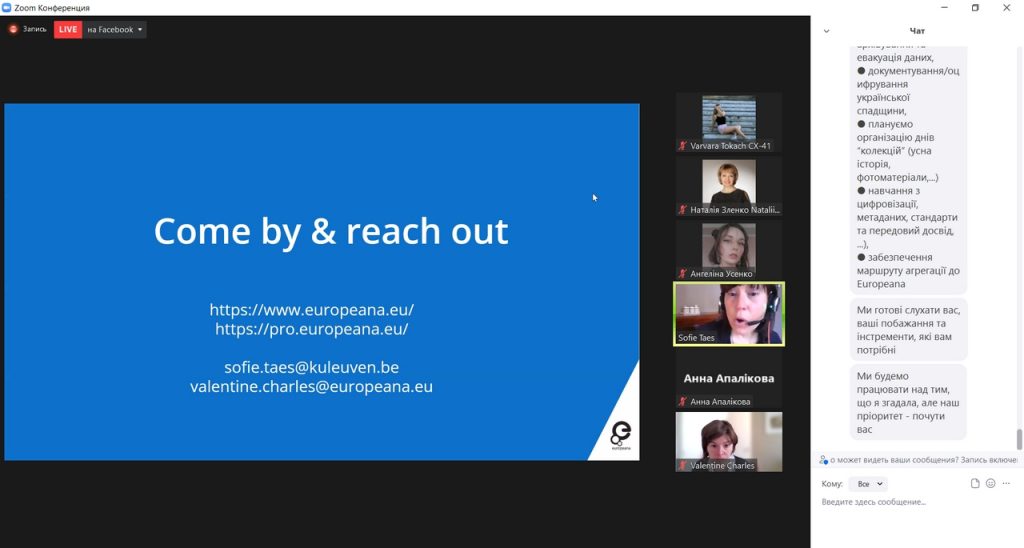
Valentine Charles, Director of Data Europeana Foundation (Netherlands), and Sofie Taes, Digital Curator KU Leuven (BE), Deputy Chairman of the Board of Europeana Network Association (Belgium), emphasized: “The main message of our presentation today is Ukrainian Heritage for Europeana and Europeana for Ukrainian Heritage. Europeana is an initiative of the European Union, which has been financially and politically supported by the European Commission since its launch in 2008. Today, Europeana is an aggregation and a space for the display of digitized European works, and we strive to make Europe’s cultural heritage accessible to all. We cooperate with various types of cultural heritage organizations (libraries, museums, archives). We have a huge collection, which is accessible through the electronic library europeana.eu. We work with information from different domains, so we have created rules to receive quality information and are ready to share the knowledge and experience with all interested Ukrainian organizations. We also have a lot of information and activities for professionals. We are not just a platform or a set of tools. This is a big network, we have the Foundation, the Association, and the Forum of Aggregators inside. We engage the creative industries, engage with community activities, and try to change the way they interact with cultural heritage. We want more Ukrainian heritage to be part of Europeana.
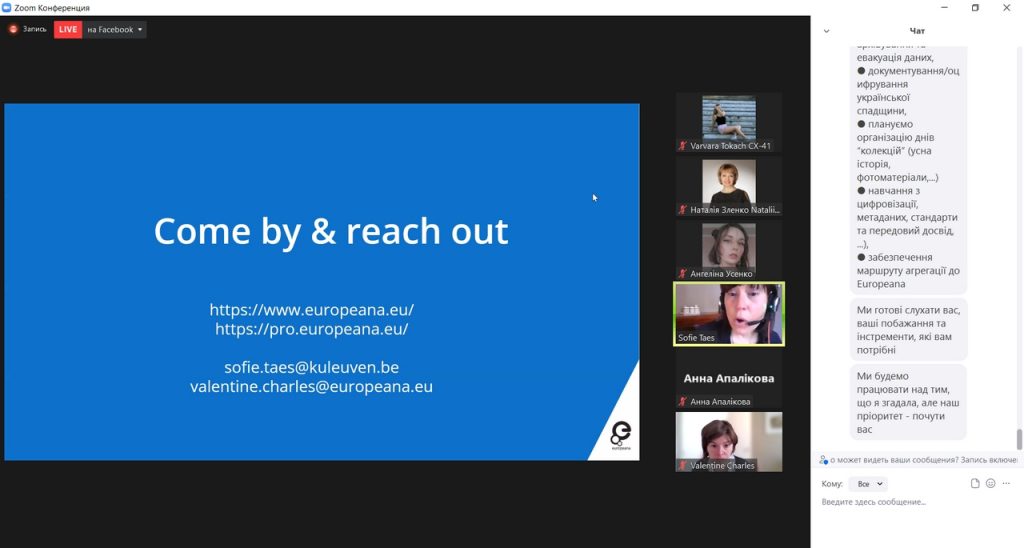
Therefore, we invite you to join the EUROPEANA NETWORK ASSOCIATION, which already has more than 3,000 members. Our main goal: positive changes, support of cultural heritage and its owners. We express our solidarity with our colleagues from Ukraine. Of course, we want to help even more. We follow what is happening in the field of the digital cultural heritage of Ukraine and are ready to work in different directions, here are our ideas: archiving and evacuation of data, documenting / digitizing Ukrainian heritage, organizing days of “collections” (oral history, photos), teaching digital competencies (metadata, standards and best practices), ensuring the aggregation route to Europeana. We are ready to work together!”
Olga Barkova, NGO GraDeSvit, Informal Professional Partnership “Digital Heritage” (Kyiv, Ukraine) in her speech “Stages of Digital European Integration: the experience of Ukrainian memory institutions” continued the theme of cooperation with Europeana. On its initiative, digital European integration began in 2012 with the delivery to Europe of the first records of Ukrainian book monuments from several libraries. Digital content was distributed in collaboration with three Europeana projects: Liked Heritage, Aphena, and Europeana Photography. This collaboration has been very useful, as it has provided an opportunity not only to monitor the development of this global digital system but also to study metadata standards and the legal field of digital resources in the digital online space, learn about record conversion, and digital collection technologies. Participation in the creation of the Ukrainian version of the thesaurus of terms for EuropeanaPhotography resources, in which 6 Ukrainian organizations were involved, was essential. The acquired knowledge and experience were transferred to Ukrainian specialists during the international event “Digital Heritage”, which took place for over 5 years in a row in Kyiv and other cities of Ukraine. These events were attended by more than 600 students from 48 cities and towns of the country, forming a professional community of digitization professionals in the cultural heritage sector. The presentation also featured screenshots from Europeana Photography’s first virtual digital photo exhibition, «All Our Yesterday», which was dedicated to the 100th anniversary of photography, and opened its physical exhibition on April 2, 2014, in Italy and later in other European countries. Europeana experts offered to present Ukrainian digitized historical photos of this photo exhibition during the Revolution of Dignity and active events on the Maidan in Kyiv. It was a manifestation of Ukraine’s cultural and professional support. And now we are receiving the same expression of professional solidarity and support from Europeana. Thus, digital European integration is entering a new stage, and it consists in preparing the technological conditions for the preparation, conversion, and delivery of digital content on the country’s cultural heritage on the platform of domestic software for memory institutions DC-Visu Information System. Europeana now features digital content from 7 Ukrainian memory organizations, a very small collection. We hope to continue our digital European integration and to present the Ukrainian cultural heritage in its resources more widely.
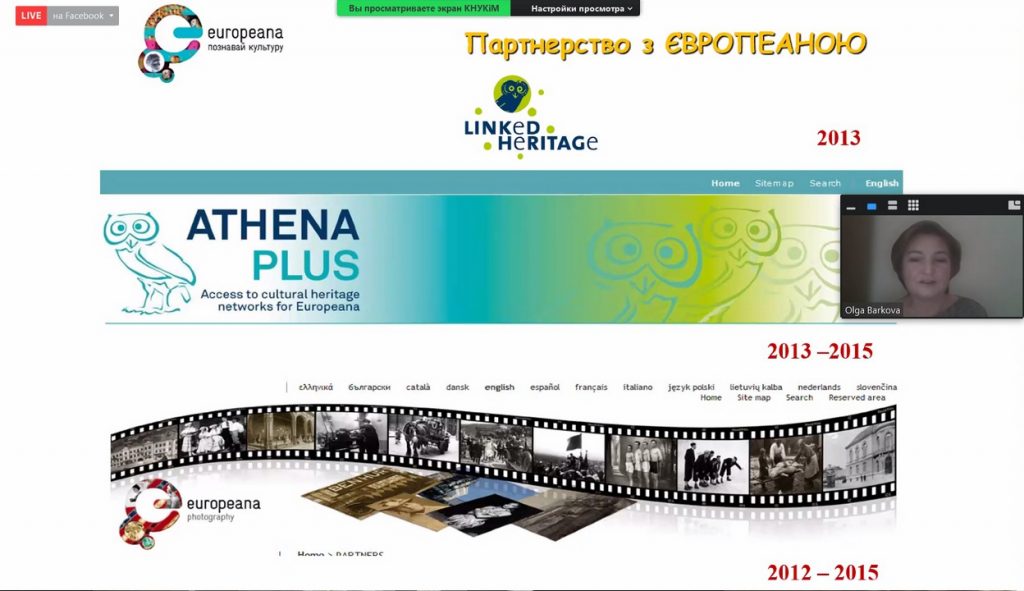
The next three speeches were on the use of 3D technology to digitize cultural heritage sites.
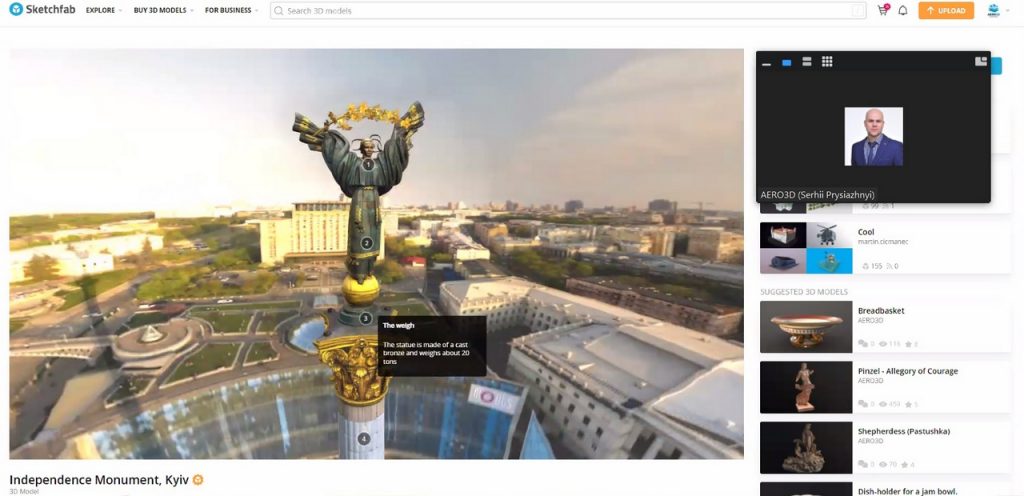
Serhii Prysiazhnyi, Director of AERO3D, Founder and Director of GraDeSvit (Kyiv, Ukraine), spoke about the experience in 3D digitization of monuments in Kyiv, other cities of Ukraine, and the creation of 3D tours of interiors and exteriors of historic buildings and cites. Currently, the company’s activities are aimed at commercializing existing digital 3D models of monuments to raise funds for the Armed Forces, as well as purchasing equipment for the postwar digital reproduction of damaged and destroyed cultural heritage sites and civil infrastructure of Ukrainian cities and towns.
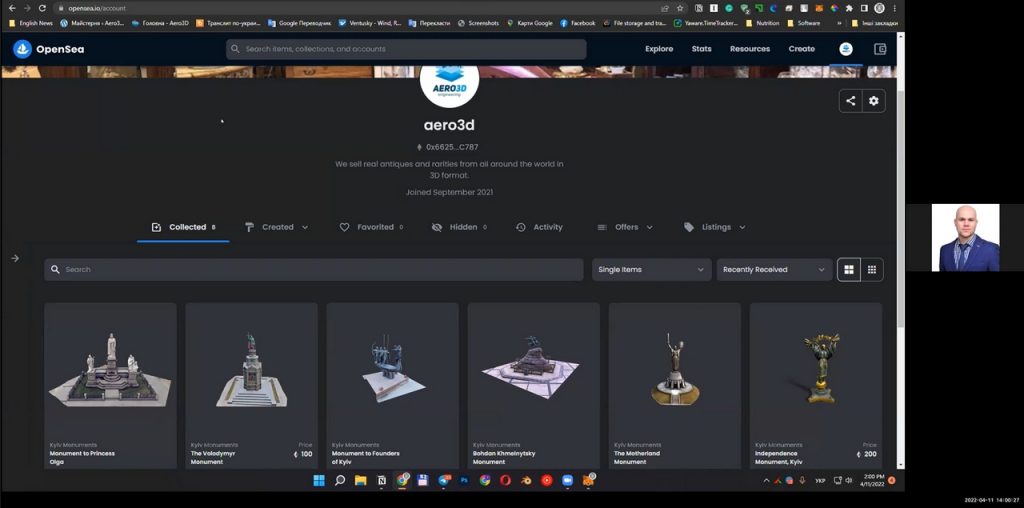
Like many similar companies and specialists, AERO3D donated its aerial photography equipment to the Territorial Defense of Kyiv. It should be added that in the framework of the UKF project in 2020, AERO3D specialists gained significant experience in laser digitization and high-quality digital reproduction of a virtual 3D model of the ruined house of Igor Sikorsky in Kyiv.
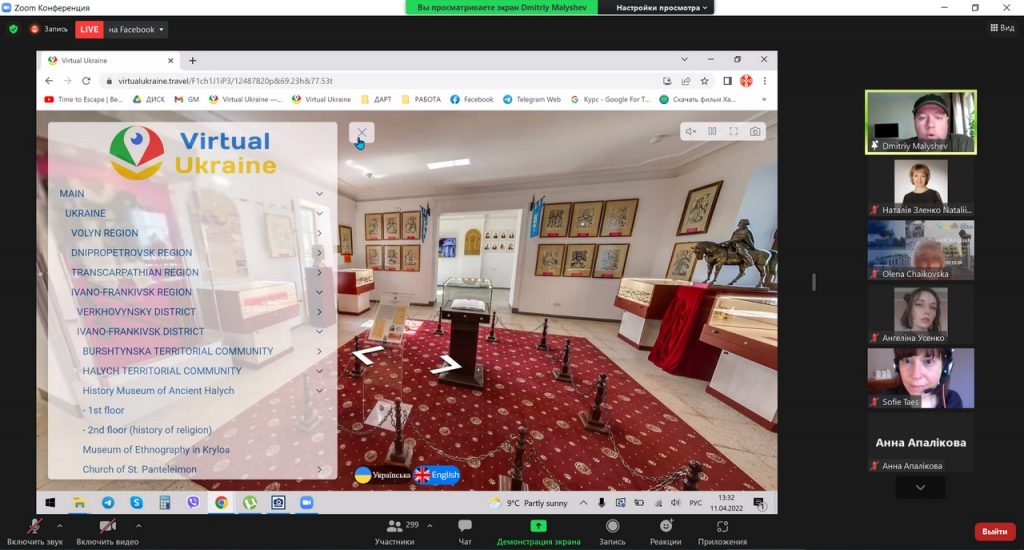
Dmytro Malyshev, Virtual Ukraine Project Manager. The section War in Ukraine (Kyiv, Ukraine) showed his work on the digital recording of the consequences of war crimes in the territories liberated from the occupiers. Dmytro stressed the importance of speeding up the digitization of those monuments that are still at risk of damage or destruction. 3D tours and 3D models help you recreate objects and temporarily replace physical visits with virtual ones.
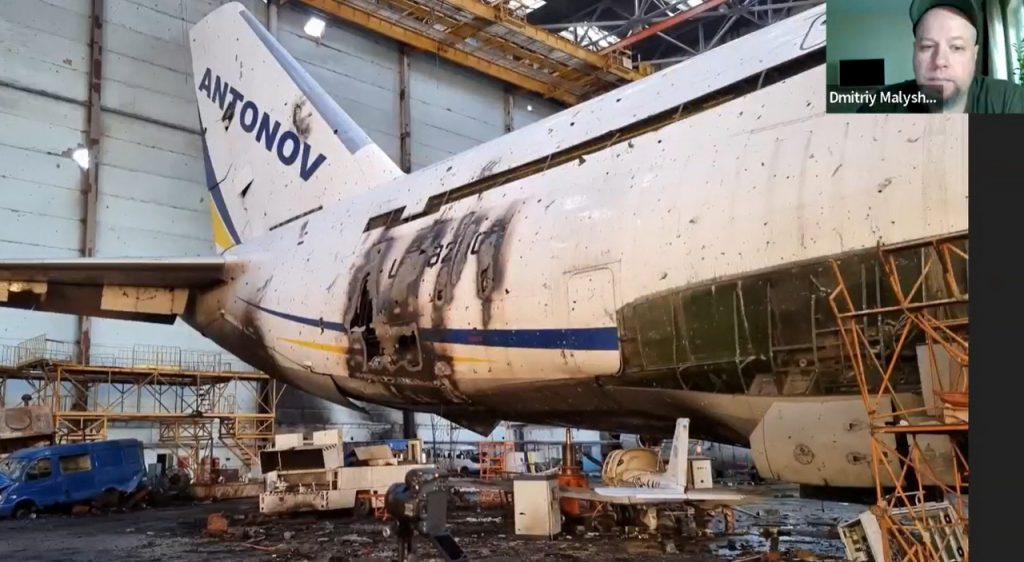
However, the war continues and there is a need to remove the effects of hostilities. Such panoramas are added to the resources of the Virtual Ukraine project, which before the war was aimed at increasing the tourist attractiveness and accessibility of Ukraine. Dmytro showed a photo of a well-known object of Ukraine’s technical heritage – the destroyed Mriya plane, which was filmed before the war. We will add that the professional community should combine their efforts, knowledge, and experience around the reproduction in 3D of the cultural heritage of Ukraine.
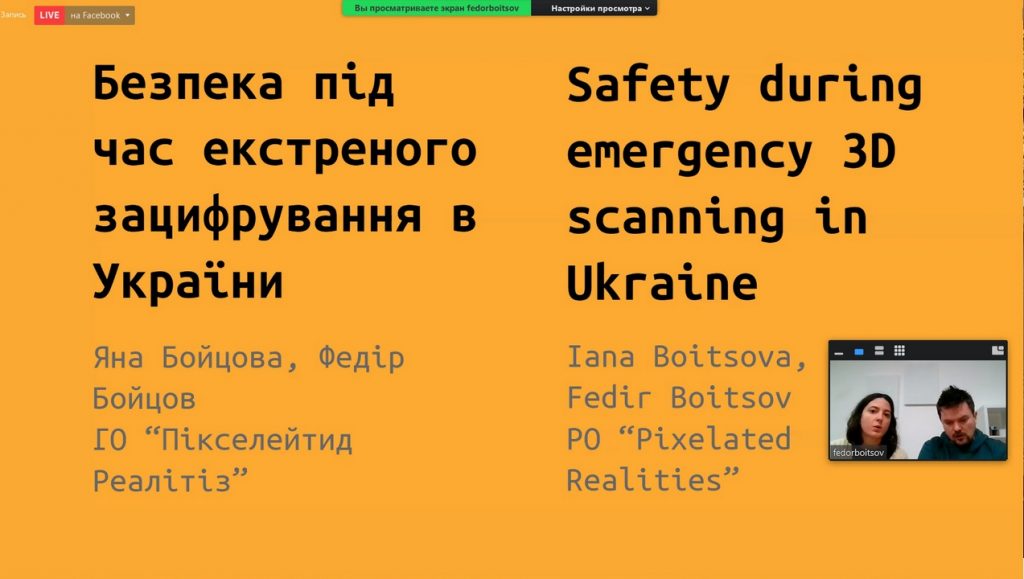
Yana and Fedir Boitsovy, PO Pixelated Realities (Odesa, Ukraine) are experienced professionals in 3D digitization and multifaceted application of 3D for a variety of cultural heritage needs. Yana and Fedir presented their rich experience of working with 3D in Odesa and other locations, as well as revealed useful aspects of 3D digitization in extreme conditions, in particular, in the realities of the war in Ukraine.
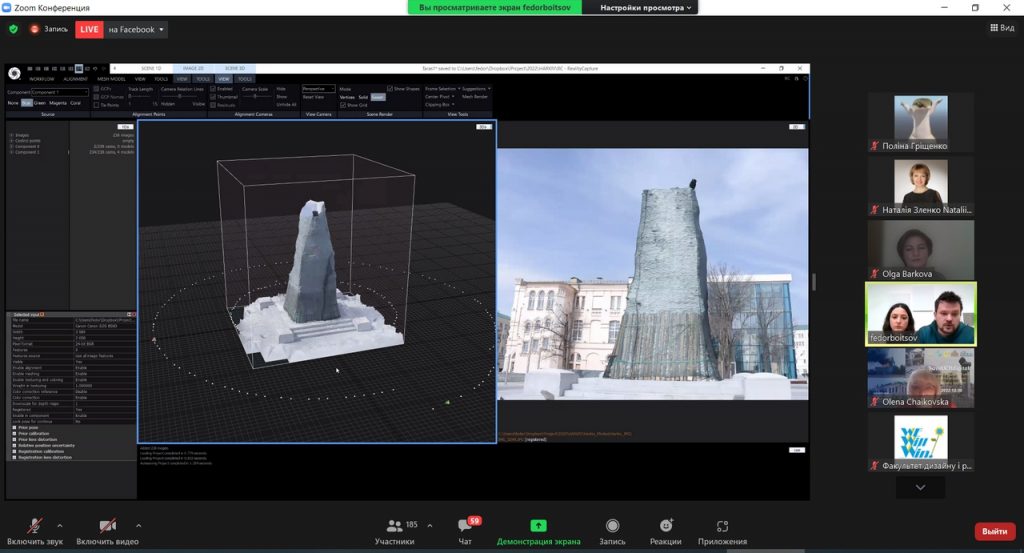
They also talked about their experience of participating in the 4CH initiative, which they used to preserve their digital archives and 3D models.
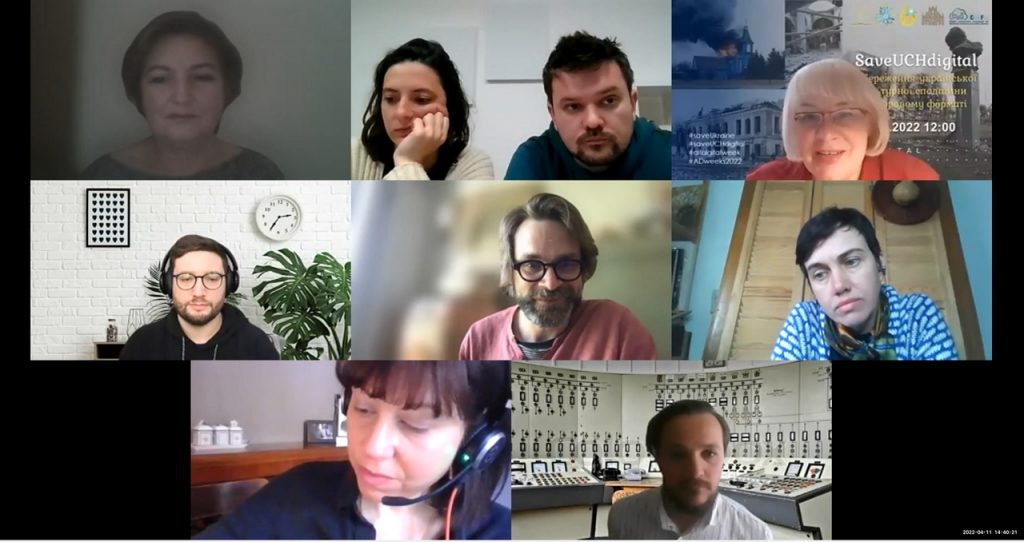
Lars Wieneke, Head of Digital Research Infrastructure at the Luxembourg Center for Contemporary and Digital History at the University of Luxembourg (C2DH), (Luxembourg), and Maciej Maryl, Director of the Digital Humanities Center at the Institute of Literary Studies of the Polish Academy of Sciences (Warsaw, Poland) during the discussions noted that the European Center of Competence for Cultural Heritage (4CH) has teamed up with many partners and authorities to create the Save the Ukraine Monuments (SUM) initiative and help digitize and preserve Ukraine’s cultural heritage for future generations.
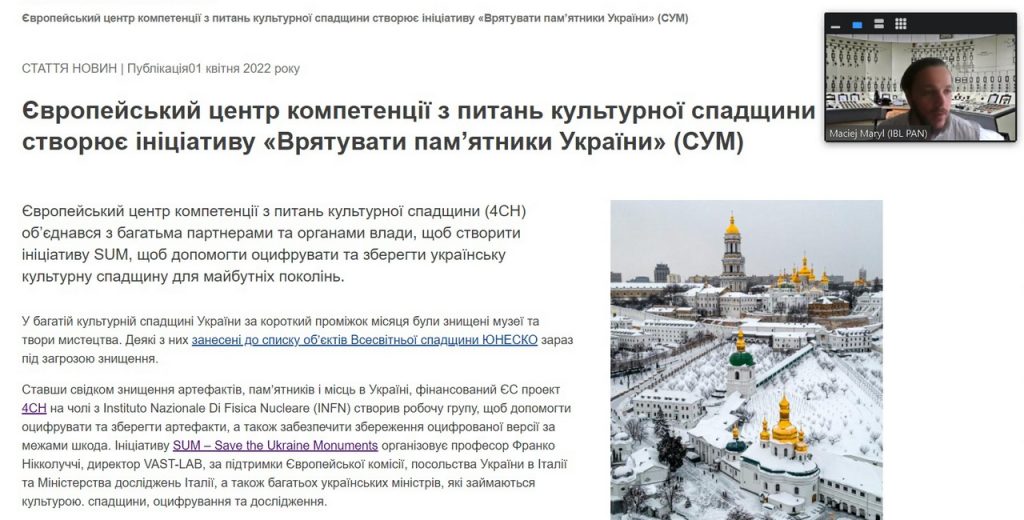
“We are trying to provide emergency assistance in preserving digital documentation on Ukraine’s cultural heritage, preserving its memory, and supporting the future restoration of property from war damage. All the data collected will be accurately preserved and returned to the rightful owner, when – hopefully, soon – the situation will improve with the end of this terrible war.
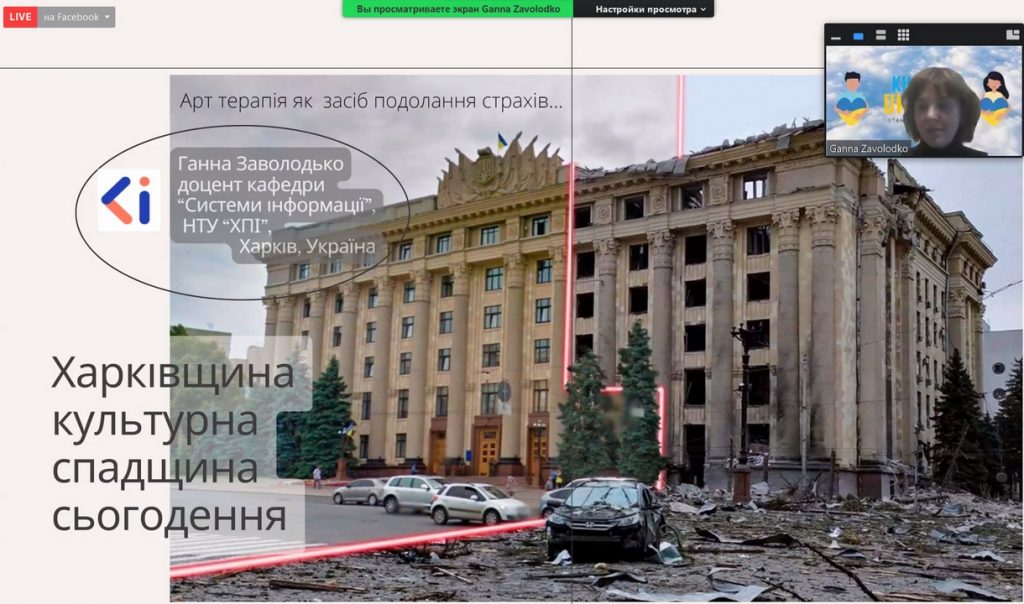
The next speaker, Hanna Zavolodko, Associate Professor of Information Systems at KhPI National Technical University (Kharkiv, Ukraine), a participant in the dComfra project, currently based in Kharkiv, said that this time she is participating not as a digital expert, but as part of the creative community of the residential building where she is staying with her family and created a small art group for children. “Art therapy has become a means of overcoming fears, drawing emotions, solving problems.” Anna demonstrated the individual and collective work of children, emphasizing that the modern cultural heritage is being formed right now, which demonstrates the unity of the Ukrainian nation and the desire for peace on our land. “Children’s drawings are the cultural heritage of our building. But we want the world to see them. That is why we are looking for platforms to organize an exhibition to inform the world about the situation in Ukraine and to raise funds for Kharkiv firefighters who work around the clock, saving the city from the effects of the shelling.”
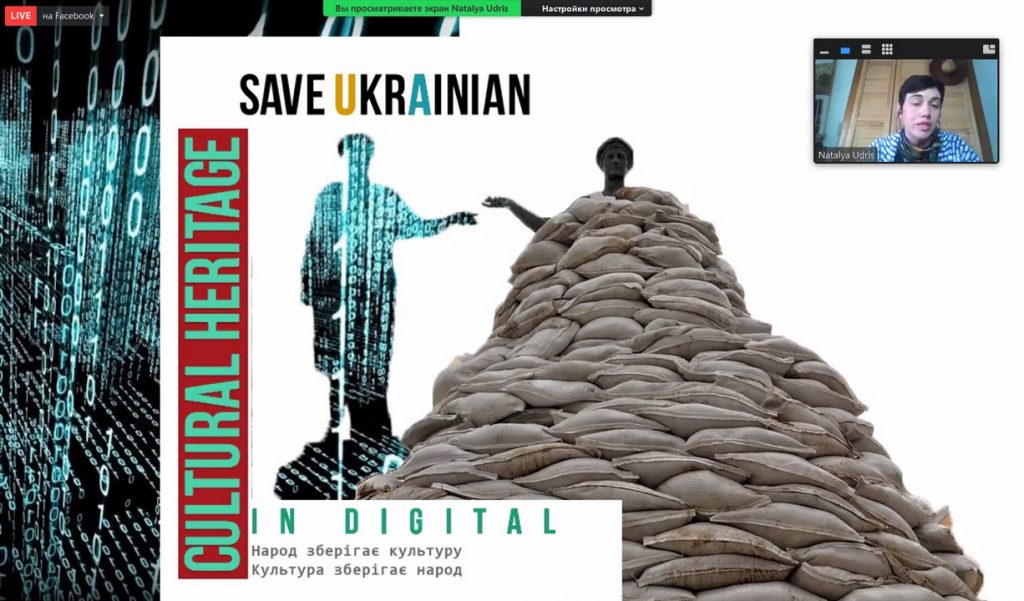
Natalia Udris-Borodavko, Head of the Department of Graphic Design at the Kyiv National University of Culture and Arts (Kyiv, Ukraine), said in her speech that the need to preserve Ukraine’s cultural heritage by digital means is a social issue. And any social problem and activities to solve it need to be widely publicized, attracting the attention not only of narrow specialists but also of the public. This is one of the tasks of visual communication.
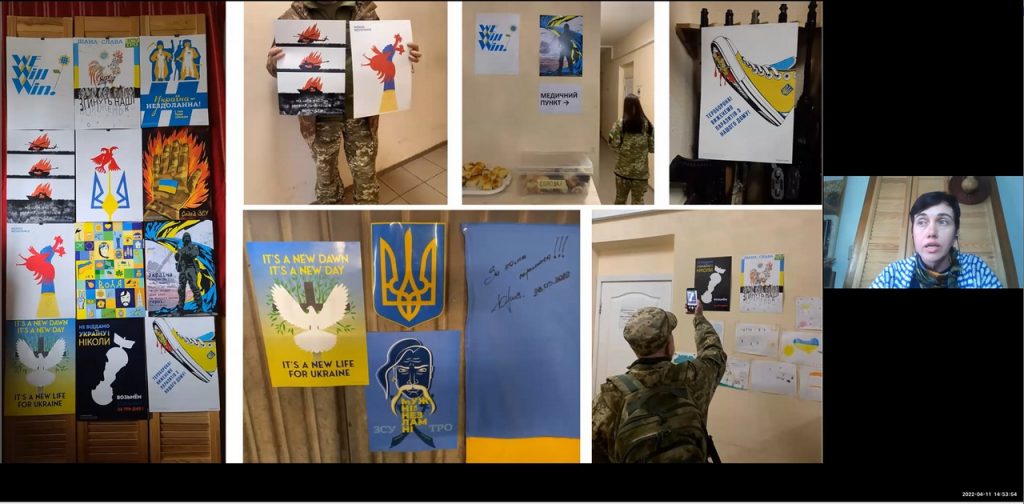
“The staff of the Department of Graphic Design of KNUC&A is always on the wave of current socio-cultural processes in Ukraine. We create content and distribute it in a wide public space – galleries, subways, city streets, and sites with free access to projects. Therefore, we are happy to join the process of preserving cultural heritage in what we can: by raising awareness of the need for this issue through social posters, social media pages, animated videos and actively informing communities about what has already been done in this area.” Ms. Natalia demonstrated posters currently being developed by students and distributed to Ukrainian defenders to motivate and give courage.
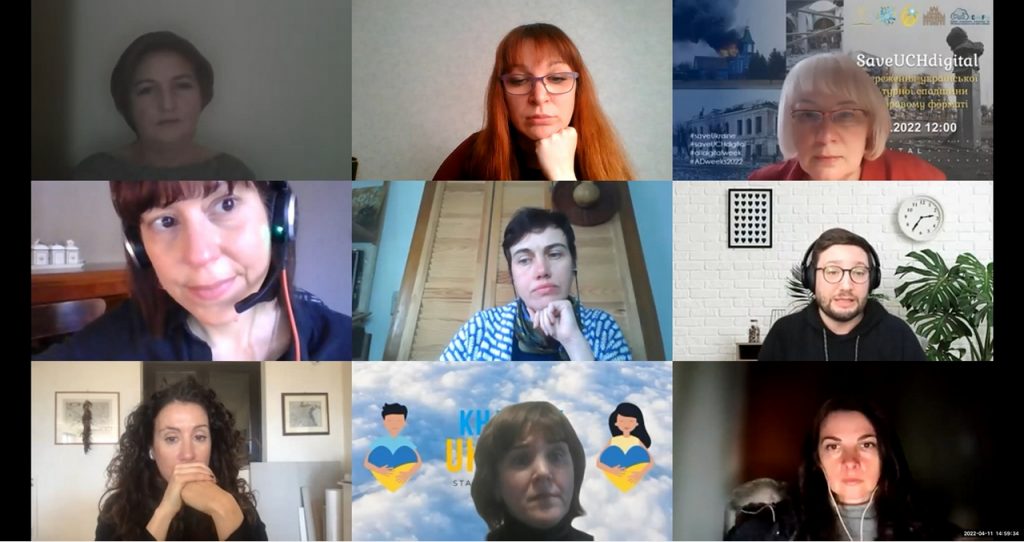
At the end of the event, Olena Chaikovska thanked all the participants for their cooperation and stressed: “Our event gathered a large audience, more than 300 participants from different parts of Ukraine and the world. I am convinced that as a result of communication we will receive closer and more useful cooperation to preserve and increase Ukraine’s cultural heritage, continue promoting Ukraine’s digital advancement, and enrich European and global digital resources with the content of Ukrainian cultural heritage together. Thank you to everyone who joined! Let’s win together! Glory to Ukraine!”
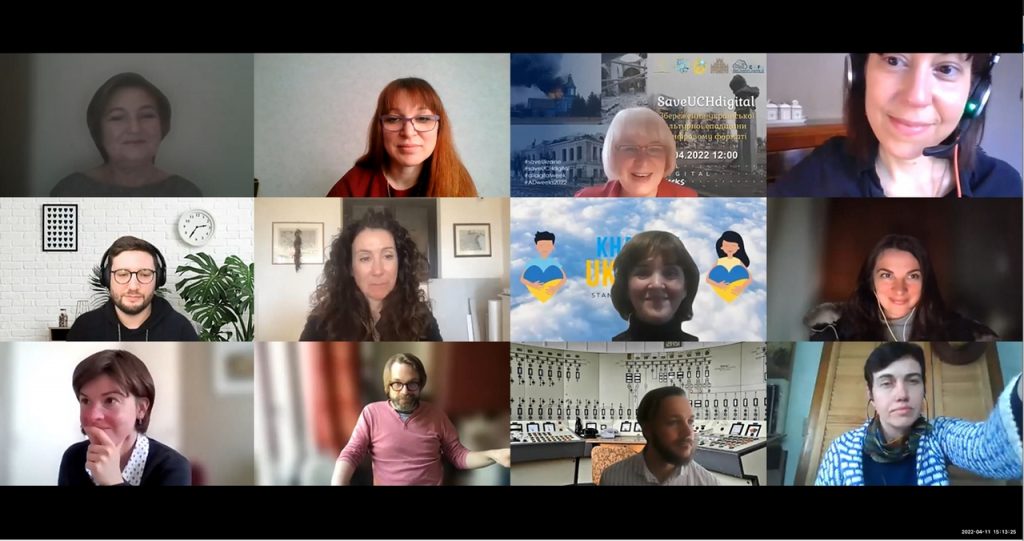
Video of the event can be seen here: https://www.facebook.com/kn.knukim/videos/673302347330645
Special thanks to Olena Morhun and students of the Department of Computer Science of Kyiv University of Culture Kateryna Yanushevska and Etan Shirman for help in translating the reports of the event and materials of initiatives.

